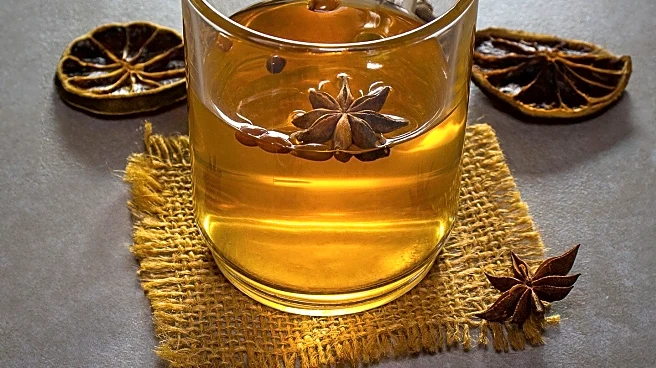What's Happening?
Star anise evening tea is gaining renewed attention as a comforting beverage during cold weather. Known for its sweet, liquorice-like aroma, star anise has been used in Asian herbal medicine for centuries.
The tea is made by simmering a whole pod of Chinese star anise in boiling water, which is then strained before drinking. It is praised for its potential benefits, including digestive comfort, respiratory ease, relaxation, and antioxidant support. The tea's connection to shikimic acid, a compound used in antiviral drug research, has sparked interest, although experts clarify that it is not an antiviral treatment.
Why It's Important?
The resurgence of star anise tea highlights a growing interest in natural wellness drinks that offer comfort and support during seasonal changes. Its potential benefits, such as aiding digestion and providing respiratory comfort, make it appealing for those seeking natural remedies. The tea's association with shikimic acid, despite not being a direct antiviral solution, underscores the intersection of traditional herbal practices and modern scientific research. This trend reflects a broader societal shift towards integrating traditional wisdom with contemporary health insights.
What's Next?
As interest in star anise tea grows, consumers are advised to ensure they purchase the correct type of star anise, as the Japanese variety is toxic. The tea's popularity may lead to increased availability in stores and online, potentially inspiring new blends and products. Healthcare professionals may see more inquiries about its benefits, prompting further research into its effects. The trend could also encourage exploration of other traditional herbal remedies, contributing to a broader acceptance of alternative wellness practices.
Beyond the Headlines
The cultural significance of star anise tea as a comforting ritual during cold weather is noteworthy. It offers a sensory experience that combines aroma, warmth, and taste, providing a moment of calm and connection to ancient traditions. This aspect of the tea's appeal may resonate with individuals seeking mindfulness and relaxation in their daily routines. The tea's role in bridging cultural heritage with modern wellness trends highlights the enduring value of traditional practices in contemporary society.










